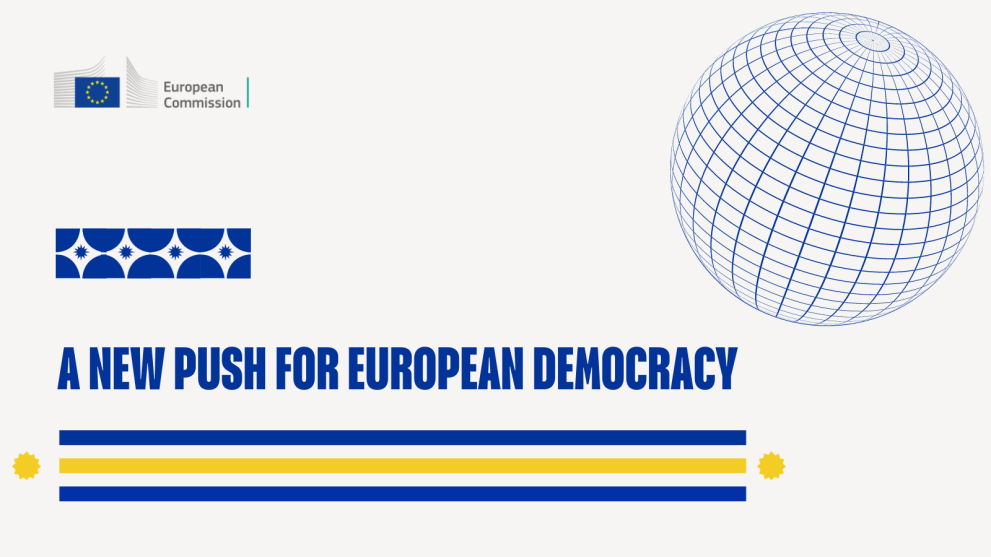
Freedom is not free
In 2024, citizens will vote in the European Parliament elections. As Commission President Ursula von der Leyen said in her State of the Union address in September: ‘this is a time to decide on what kind of future and what kind of Europe we want’.
However, democracy is under strain from numerous angles: Russia’s invasion of Ukraine, the climate crisis, AI, misinformation, and economic inequalities.
The Commission is resolute in its political commitment to a ‘new push for European democracy’. To meet this top priority, the Commission funds research projects that will nurture, protect, and strengthen democracy – amongst other initiatives. They will also give citizens the means to contribute to this goal, ensuring the next generation are empowered to advance democratic ideals.
From Brussels to Kyiv, democratic values must be at the core of Europe’s future imaginings. The following are a series of projects that are funded by the European Unions’ Horizon Europe framework programme and managed by the European Research Executive Agency (REA).
Democratic Efficacy and the Varieties of Populism in Europe
Populist sentiments and politics are spreading across Europe, dividing society into ‘Us’ and ‘Them’. The EU-funded DEMOS project addresses this challenge, thereby ensuring stability of liberal democracies. This project is funded through the Culture, creativity and inclusive society part of Horizon Europe. Several educational tools were also developed. Zsolt Boda, project coordinator of the DEMOS project, explained: “for instance, we have developed Wing, a game about populism and social change. It aims to help players learn about a possible path to becoming active citizens, to raise awareness of the skills needed to stand up against an authoritarian regime. We expect some of the research findings will have a lasting effect on how we think about populism, and we also hope they may be translated into new legal ideas, interpretations and ultimately decisions”.
Rebuilding governance and resilience out of the pandemic
The COVID-19 pandemic came at the end of a decade of social, economic, and political crises for Europe. It stalled economic recovery and affected democratic politics and governance throughout the continent, calling for institutional transformation at various levels. Also funded through the Culture, creativity and inclusive society part of Horizon Europe, the REGROUP project will provide the EU with actionable advice on how to rebuild post-pandemic governance and public policies in an effective and democratic way. It will do so based on an analysis of the socio-political consequences of the pandemic, and an empirically-informed normative evaluation of it. Bringing together a consortium of 14 institutions, the project aims to achieve a high degree of policy, societal, and scientific impact.
Fostering research to boost democratic practices
Funded under the Marie Skłodowska-Curie Actions programme, the GEM-DIAMOND project will explore the impact of EU instruments on democratic institutions, the rise of alternative models and the existing rising dissensus driven by internal contestation and external competition. The project is part of an ongoing research programme on globalisation, Europe and multilateralism. GEM-DIAMOND will conduct research and deliver training to 15 early career researchers (ECRs) on improved citizens' knowledge and democratic practices.
Democratic responses to the challenges of deepfakes and infodemics
Generative adversarial networks (GANs) are generative AI models capable of reproducing realistic images, videos and voice outputs. Because they have the potential to create highly realistic content, they can also pose a threat to democracies through the creation and circulation of deepfakes, which spread false information and undermine trust. In this context, the EU-funded SOLARIS project will focus on the challenges and opportunities posed by GANs in the context of democracy. It will study how deepfakes circulate and are trusted by users, thus threatening democratic processes. It will also develop regulatory guidelines about GANs and generative AI for the promotion of democratic engagement. This project is funded through Culture, creativity and inclusive society part of Horizon Europe.
Studying society and the brain to understand youth political engagement
The Marie Skłodowska-Curie Actions funded IP-PAD project (Interdisciplinary Perspectives on the Politics of Adolescence & Democracy) aims to address the understanding of how young adolescent citizens process political information and how this affects their engagement with politics. This engagement is important as trends indicate we have witnessed a decline in youth satisfaction with democracy, while the social and political challenges of climate change, misinformation, declining voter turnout, polarisation and radicalisation raise concerns about the future of liberal democracies in Europe. IP-PAD will fill this gap by studying how the developing adolescent brain in the different socio-political contexts of five European countries underpins the emergence of the social, and eventually, political self.
Details
- Publication date
- 14 September 2023
- Author
- European Research Executive Agency
